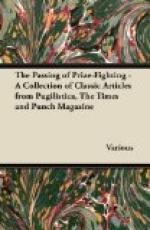There is a report of the stoppage of one of the most respectable hard-bake houses in the metropolis. The firm had been speculating considerably in “Prince Albert’s Rock,” and this is said to have been the rock they have ultimately split upon. The boys will be the greatest sufferers. One of them had stripped hia jacket of all its buttons as a deposit on some tom-trot, which the house had promised to supply on the following day; and we regret to say, there are whispers of other transactions of a similar character.
Money has been abundant all day, and we saw a half-crown piece and some halfpence lying absolutely idle in the hands of an individual, who, if he had only chosen to walk with it into the market, might have produced a very alarming effect on some minor description of securities. Cherries were taken very freely at twopence a pound, and Spanish (liquorice) at a shade lower than yesterday. There has been a most disgusting glut of tallow all the week, which has had an alarming effect on dips, and thrown a still further gloom upon rushlights.
The late discussions on the timber duties have brought the match market into a very unsettled state, and Congreve lights seem destined to undergo a still further depression. This state of things was rendered worse towards the close of the day, by a large holder of the last-named article unexpectedly throwing an immense quantity into the market, which went off rapidly.
* * * * *
SOMETHING WARLIKE.
Many of our readers must be aware, that in pantomimic pieces, the usual mode of making the audience acquainted with anything that cannot be clearly explained by dumb-show, is to exhibit a linen scroll, on which is painted, in large letters, the sentence necessary to be known. It so happened that a number of these scrolls had Been thrown aside after one of the grand spectacles at Astley’s Amphitheatre, and remained amongst other lumber in the property-room, until the late destructive fire which occurred there. On that night, the wife of one of the stage-assistants—a woman of portly dimensions—was aroused from her bed by the alarm of fire, and in her confusion, being unable to find her proper habiliments, laid hold of one of these scrolls, and wrapping it around her, hastily rushed into the street, and presented to the astonished spectators an extensive back view, with the words, “Bombard the citadel,” inscribed in legible characters upon her singular drapery.
HUME’S TERMINOLOGY.
Hume is so annoyed at his late defeat at Leeds, that he vows he will never make use of the word Tory again as long as he lives. Indeed, he proposes to expunge the term from the English language, and to substitute that which is applied to, his own party. In writing to a friend, that “after the inflammatory character of the oratory of the Carlton Club, it is quite supererogatory for me to state (it being notorious) that all conciliatory measures will be rendered nugatory,” he thus expressed himself:—“After the inflamma_whig_ character of the ora_whig_ of the nominees of the Carlton Club, it is quite supereroga_whig_ for me to state (it being no_whig_ous) that all concilia_whig_ measures will be rendered nuga_whig_.”




